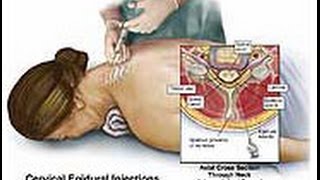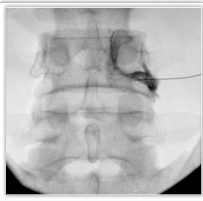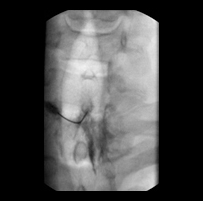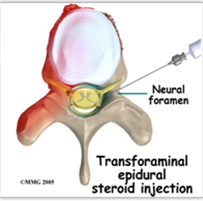Epidural gluco-corticoid injections are commonly given to patients with leg and/or back pain to relieve such pain and improve mobility without surgery. These steroid injections buy time to allow healing to occur and/or as an attempt to avoid surgery after other conservative (non-surgical) treatment approaches have failed.
During a trans-foraminal injection, a thin needle is inserted into the epidural space through the bony opening of vertebral column from where a nerve root exits. (See Figure 1, Neuroforamen). The drug is delivered exactly in the area where disc is compressing nerve and causing inflammation.

The procedure is performed with the patient lying on their belly using fluoroscopic (real-time x-ray) guidance, which helps to prevent damage to the nerve root. A radio-opaque dye is injected to enhance the fluoroscopic images and to confirm that the needle is properly placed (See Figure 2). This technique allows the cortisone medicine to be placed closer to the irritated nerve root. The exposure to radiation is minimal.
Indications include disc herniations, Lumbar canal stenosis, vertebral fractures, Cancer tumor compressing epidural space, Herpes zoster pain etc.
Patients with disc herniations and leg pain attains maximal improvement in 6 weeks. Interestingly, long-term success rates for trans-foraminal epidural glucocorticoid injections ranged from 71% to 84%.
Structures (pain generators) like nerves/discs are accessible to neural blockade.
Surgery of these structure may fail to cure and may worsen painful spinal conditions.
Degenerative processes of the spine and the origin of spinal pain is complex.
The effectiveness of a large variety of therapeutic interventions used to manage chronic spinal pain has not been demonstrated conclusively.
There is increasing evidence supporting the use of interventional techniques in managing spinal pain
To deliver corticosteroid close to the site of pathology
Trans Foraminal Epidural Steroid Injection (TFESI) – more specific & targeted to site of pathology
Interlaminar injections are very effective in cervical (neck) area
Decrease size of disc means Decrease symptoms? It is not always the case, as compression may continue in spite of resolution of the symptom. In many cases MRI shows disc bulge but patients are pain free.
It is also well described in many studies that asymptomatic individuals present with disc herniations that are evident on CT / MRI scans
Nerve damage of various nature (Partial axonal damage, Neuroma formation, Focal demyelination, Intraneural edema), Impaired microcirculation, Chemical irritation, Inflammation. The Steroid acts to reverse all these.
Lumbar Epidural Steroid Injection 
Cervical Epidural Injection 
Epidural Injections Treatment Testimonial
"Complaint of Pain is cervical region since 6 Months MRI : Shows C6 – C7 disc prolapse.I have taken treatment at pain clinic of India Kalyan branch ---- I received epidural injection 1 Month back.Now pain has reduced above 70 %, now only exercises will settle pain completely. I am satisfied with epidural injection."
-- Dr. Vrushali R Khare









